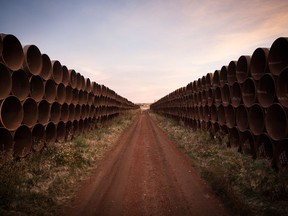
Global oil and natural gas markets have been turned on their heads in the past month, but the full impact of the turbulence arrived Tuesday.
U.S. President Joe Biden announced a ban on all oil and gas imports from Russia, sending West Texas Intermediate (WTI) crude prices skyrocketing above US$128 a barrel — its highest point since 2008 — before ending the day at $123.70, up more than $5.
As the conflict in Ukraine drags on, Biden said the United States is “targeting the main artery of Russia’s economy” by prohibiting oil and gas shipments from that country.
It also bans new U.S. investment in Russia’s energy sector.
“It’s an earthquake,” Premier Jason Kenney said in an interview Tuesday from the sidelines of CERAWeek by S&P Global energy conference in Houston.
“It is, I think, the beginning of a potential global realignment in how we supply energy.”
Russian President Vladimir Putin responded by signing an order Tuesday to ban the export of some raw materials to other countries, although it’s still unclear what products — and countries — it would apply to, according to Bloomberg News.
What is apparent is Tuesday’s developments mark a further escalation in the economic conflict between the West and Russia, one of the world’s largest exporters of oil and natural gas, following its invasion of Ukraine.
The events will likely propel energy prices even higher, putting the squeeze on consumers as inflation is already at multi-year highs and gasoline prices are surging.
“This is a really historic moment. Energy markets and policy will be defined in the future significantly by this event,” said Jackie Forrest, executive director of the ARC Energy Research Institute in Calgary.
“You are going to see more movement to care about energy security. In terms of policy, there will probably be some initial pulling back on some of those environmental goals but, long term, potentially accelerating them with the idea of getting off hydrocarbons.”
The U.S. imported 672,000 barrels per day (bpd) of oil and other petroleum products from Russia last year. Canada remains the top supplier to the U.S., exporting 4.3 million bpd.
For global energy markets, this is a pivotal moment coming out of the pandemic as demand increases and supplies are already stretched.
Prices are spiking for oil and natural gas — particularly in Europe — raising the broader question of how consumers and producers will respond to a new era of geopolitical upheaval and energy security.
“Russian exports are a pretty meaningful piece of global supply,” Cenovus Energy CEO Alex Pourbaix said in an interview from Houston.
“I’m personally confident that you will see the other oil-producing nations of the world be able, with time, to make up that slack . . . The world’s oil needs are going to get met. But I do think for a period of time, we are likely in for a pretty volatile oil market.”
Alberta produces about 3.6 million barrels per day (bpd) and production has increased over the past decade, mainly from the oilsands.
The province should be an obvious choice for the United States as it looks to replace Russian oil, Kenney said.
“It means we have to up our game,” he added. “It means there is going to be growing global demand for our products, both in the short and long term — the short term to backfill the growing strike on Russian oil.”
Kenney also hopes to see a revival of the Keystone XL pipeline, which was derailed last year after the U.S. president cancelled its cross-border permits. Although, project proponent TC Energy has no plans to revive it.

Don’t expect to see a sudden surge in oilsands spending to fill the gap from Russian barrels, although high prices will encourage some companies to maximize their existing capacity.
Suncor Energy CEO Mark Little believes Canadian production will increase by 100,000 to 200,000 barrels per day this year as existing projects, such as the company’s Fort Hills oilsands mine, ramp up or incrementally raise output.
“We are a long-cycle business, so this isn’t like we can go and drill some holes and drive up production for a year,” Little said in an interview.
“The industry will be working hard every single day to maximize every barrel out of the ground.”
The ongoing challenge will be to provide low-cost economic supplies and also continue to reduce greenhouse gas emissions, as Canada’s largest oilsands producers have set a target of achieving net-zero emissions by 2050, he added.
During his announcement, Biden called the crisis a stark reminder of the need to become energy independent, but it should also motivate the U.S. and other countries to accelerate the transition to clean energy.
The world consumes about 100 million barrels of oil per day, close to pre-pandemic levels.
Much of the short-term pressure from escalating energy sanctions will be felt in Europe, which relies more heavily on Russian oil and gas imports. The United Kingdom said Tuesday it will phase out Russian oil imports and petroleum products by year’s end.
Other European countries haven’t followed suit, but the EU is looking to significantly reduce demand for Russian gas this year.
Rystad Energy oil analyst Bjornar Tonhaugen said the 4.3 million bpd of oil shipped from Russia to the West “cannot be easily replaced by other sources in a short period of time,” and there are few signs Middle East producers with spare capacity will open the spigots.
That puts the focus on U.S. shale producers, who have the ability to increase output relatively quickly. Canadian conventional producers can also raise output.
These daunting issues will take time to sort out.
“I don’t think we really understand how great a change this is,” said Tristan Goodman, president of the Explorers and Producers Association of Canada.
“This is a significant event unfolding before our eyes that will simply change the way the world is operating.”
Chris Varcoe is a Calgary Herald columnist.
You can read more of the news on source
